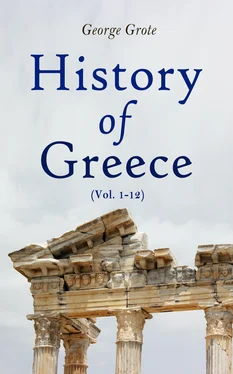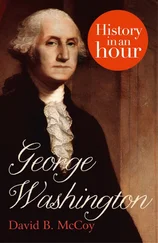To set forth the history of a people by whom the first spark was set to the dormant intellectual capacities of our nature,—Hellenic phenomena, as illustrative of the Hellenic mind and character,—is the task which I propose to myself in the present work; not without a painful consciousness how much the deed falls short of the will, and a yet more painful conviction, that full success is rendered impossible by an obstacle which no human ability can now remedy,—the insufficiency of original evidence. For, in spite of the valuable expositions of so many able commentators, our stock of information respecting the ancient world still remains lamentably inadequate to the demands of an enlightened curiosity. We possess only what has drifted ashore from the wreck of a stranded vessel; and though this includes some of the most precious articles amongst its once abundant cargo, yet if any man will cast his eyes over the citations in Diogenes Laërtius, Athenæus, or Plutarch, or the list of names in Vossius de Historicis Græcis, he will see with grief and surprise how much larger is the proportion which, through the enslavement of the Greeks themselves, the decline of the Roman Empire, the change of religion, and the irruption of barbarian conquerors, has been irrecoverably submerged. We are thus reduced to judge of he whole Hellenic world, eminently multiform as it was, from a few compositions; excellent, indeed, in themselves, but bearing too exclusively the stamp of Athens. Of Thucydides and Aristotle, indeed, both as inquirers into matter of fact, and as free from narrow local feeling, it is impossible to speak too highly; but, unfortunately, that work of the latter which would have given us the most copious information regarding Grecian political life—his collection and comparison of one hundred and fifty distinct town constitutions—has not been preserved: and the brevity of Thucydides often gives us but a single word where a sentence would not have been too much, and sentences which we should be glad to see expanded into paragraphs.
Such insufficiency of original and trustworthy materials, as compared with those resources which are thought hardly sufficient for the historian of any modern kingdom, is neither to be concealed nor extenuated, however much we may lament it. I advert to the point here on more grounds than one. For it not only limits the amount of information which an historian of Greece can give to his readers,—compelling him to leave much of his picture an absolute blank,—but it also greatly spoils the execution of the remainder. The question of credibility is perpetually obtruding itself, and requiring a decision, which, whether favorable or unfavorable, always introduces more or less of controversy; and gives to those outlines, which the interest of the picture requires to be straight and vigorous, a faint and faltering character. Expressions of qualified and hesitating affirmation are repeated until the reader is sickened; while the writer himself, to whom this restraint is more painful still, is frequently tempted to break loose from the unseen spell by which a conscientious criticism binds him down,—to screw up the possible and probable into certainty, to suppress counterbalancing considerations, and to substitute a pleasing romance in place of half-known and perplexing realities. Desiring, in the present work, to set forth all which can be ascertained, together with such conjectures and inferences as can be reasonably deduced from it, but nothing more,—I notice, at the outset, that faulty state of the original evidence which renders discussions of credibility, and hesitation in the language of the judge, unavoidable. Such discussions, though the reader may be assured that they will become less frequent as we advance into times better known, are tiresome enough, even with the comparatively late period which I adopt as the historical beginning; much more intolerable would they have proved, had I thought it my duty to start from the primitive terminus of Deukaliôn or Inachus, or from the unburied Pelasgi and Leleges, and to subject the heroic ages to a similar scrutiny. I really know nothing so disheartening or unrequited as the elaborate balancing of what is called evidence,—the comparison of infinitesimal probabilities and conjectures all uncertified,—in regard to these shadowy times and persons.
The law respecting sufficiency of evidence ought to be the same for ancient times as for modern; and the reader will find in this History an application, to the former, of criteria analogous to those which have been long recognized in the latter. Approaching, though with a certain measure of indulgence, to this standard, I begin the real history of Greece with the first recorded Olympiad, or 776 B. C. To such as are accustomed to the habits once universal, and still not uncommon, in investigating the ancient world, I may appear to be striking off one thousand years from the scroll of history; but to those whose canon of evidence is derived from Mr. Hallam, M. Sismondi, or any other eminent historian of modern events, I am well assured that I shall appear lax and credulous rather than exigent or sceptical. For the truth is, that historical records, properly so called, do not begin until long after this date: nor will any man, who candidly considers the extreme paucity of attested facts for two centuries after 776 B. C., be astonished to learn that the state of Greece in 900, 1000, 1100, 1200, 1300, 1400 B. C., etc.,—or any earlier century which it may please chronologists to include in their computed genealogies,—cannot be described to him upon anything like decent evidence. I shall hope, when I come to the lives of Socrates and Plato, to illustrate one of the most valuable of their principles,—that conscious and confessed ignorance is a better state of mind, than the fancy, without the reality, of knowledge. Meanwhile, I begin by making that confession, in reference to the real world of Greece anterior to the Olympiads; meaning the disclaimer to apply to anything like a general history,—not to exclude rigorously every individual event.
The times which I thus set apart from the region of history are discernible only through a different atmosphere,—that of epic poetry and legend. To confound together these disparate matters is, in my judgment, essentially unphilosophical. I describe the earlier times by themselves, as conceived by the faith and feeling of the first Greeks, and known only through their legends,—without presuming to measure how much or how little of historical matter these legends may contain. If the reader blame me for not assisting him to determine this,—if he ask me why I do not undraw the curtain and disclose the picture,—I reply in the words of the painter Zeuxis, when the same question was addressed to him on exhibiting his master-piece of imitative art: “The curtain is the picture.” What we now read as poetry and legend was once accredited history, and the only genuine history which the first Greeks could conceive or relish of their past time: the curtain conceals nothing behind, and cannot, by any ingenuity, be withdrawn. I undertake only to show it as it stands,—not to efface, still less to repaint it.
Three-fourths of the two volumes now presented to the public are destined to elucidate this age of historical faith, as distinguished from the later age of historical reason: to exhibit its basis in the human mind,—an omnipresent religious and personal interpretation of nature; to illustrate it by comparison with the like mental habit in early modern Europe; to show its immense abundance and variety of narrative matter, with little care for consistency between one story and another; lastly, to set forth the causes which overgrew and partially supplanted the old epical sentiment, and introduced, in the room of literal faith, a variety of compromises and interpretations.
Читать дальше












